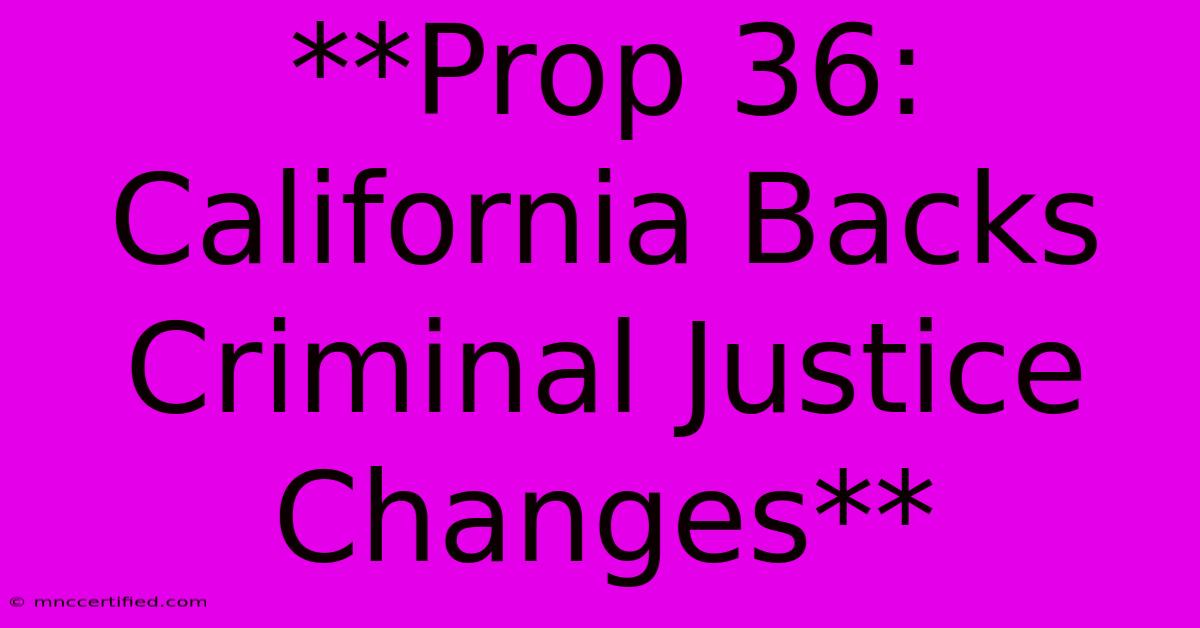**Prop 36: California Backs Criminal Justice Changes**

Table of Contents
Prop 36: California Backs Criminal Justice Changes
California's Proposition 36, also known as the "Reducing Recidivism Act of 2020," is a significant step forward in the state's criminal justice reform efforts. Passed by voters in November 2020, Prop 36 focuses on reducing recidivism rates by providing alternative sentencing options and expanding access to rehabilitation programs for individuals convicted of nonviolent drug offenses.
Key Provisions of Prop 36:
- Expansion of Drug Treatment Programs: The proposition requires the California Department of Corrections and Rehabilitation (CDCR) to prioritize drug treatment programs for individuals convicted of nonviolent drug offenses. This includes expanding access to evidence-based treatment programs and ensuring sufficient funding for these initiatives.
- Diversion from Prison: Prop 36 allows for nonviolent drug offenders to be diverted from prison to drug treatment programs under certain conditions. This aims to address the underlying issues driving drug use and prevent repeat offenses.
- Early Release for Eligible Individuals: The proposition permits individuals currently serving time for nonviolent drug offenses to be eligible for early release if they participate in and successfully complete drug treatment programs.
- Modifications to Parole and Probation: Prop 36 introduces changes to the parole and probation systems for individuals convicted of nonviolent drug offenses, emphasizing rehabilitation and community reintegration.
Aiming to Reduce Recidivism:
The primary goal of Proposition 36 is to lower the high recidivism rates associated with drug offenses. By providing access to effective drug treatment and alternative sentencing options, the proposition aims to address the root causes of recidivism and support individuals in their journey towards rehabilitation.
The Impact of Prop 36:
- Increased Access to Treatment: The expansion of drug treatment programs has led to increased access for individuals in need. This has been particularly beneficial for individuals struggling with addiction and those who have been incarcerated for nonviolent drug offenses.
- Reduced Prison Population: Prop 36's provisions have contributed to a reduction in the state's prison population, freeing up resources for other initiatives. This has also alleviated pressure on the overcrowded prison system.
- Focus on Reintegration: The emphasis on rehabilitation and community reintegration has empowered individuals to rebuild their lives and contribute positively to society.
Looking Ahead:
While Proposition 36 has been a significant step in the right direction, there is still work to be done in California's criminal justice system. Ongoing efforts to address issues like racial disparities in sentencing, inadequate funding for rehabilitation programs, and access to support services are essential to further reduce recidivism rates and create a more just and equitable system.
Keywords: Prop 36, California, Criminal Justice Reform, Drug Offenses, Recidivism, Drug Treatment, Rehabilitation, Sentencing, Parole, Probation, Prison Population, Community Reintegration
Note: This article provides a comprehensive overview of Prop 36 and its impact. You can further enhance its SEO by adding relevant internal and external links, providing statistics and data on recidivism rates, and discussing the ongoing debates and challenges surrounding criminal justice reform in California. Remember to keep your content updated and relevant by incorporating news and updates on Prop 36 and its implementation.

Thank you for visiting our website wich cover about **Prop 36: California Backs Criminal Justice Changes**. We hope the information provided has been useful to you. Feel free to contact us if you have any questions or need further assistance. See you next time and dont miss to bookmark.
Featured Posts
-
Bitcoin Price Jumps After Trump Tweet
Nov 07, 2024
-
Trump Victory Sparks Bitcoin Price Rally
Nov 07, 2024
-
Droopy Eyelid Surgery Covered By Insurance
Nov 07, 2024
-
Where I Can Invest Reakl Estate In Perugia
Nov 07, 2024
-
Gary Barlow Sons Height Compared To Dad
Nov 07, 2024